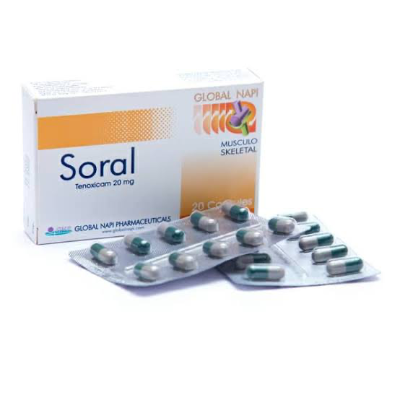


Tenoxicam is used to reduce pain, swelling, joint stiffness, and other symptoms from rheumatoid arthritis, osteoarthritis, and other inflammatory conditions (such as ankylosing spondylitis, tendinitis, bursitis).
20mg once daily taken at the same time.
Children under 18 years
Breastfeeding
Galactosaemia
Gastritis
Gastrointestinal haemorrhage
History of peptic ulcer
Peptic ulcer
Severe cardiac failure
Severe hepatic impairment
Severe renal impairment
Third trimester of pregnancy
Tenoxicam is contraindicated during the third trimester of pregnancy but may be used with caution during the first and second trimester.
The use of tenoxicam in the third trimester is contraindicated by the manufacturer and the manufacturer advises, that tenoxicam should only be used in the first and second trimesters if clearly necessary.
In early pregnancy there may be an increased risk of foetal cardiovascular malformation. In late pregnancy there may be an increased risk of premature closure of the ductus arteriosus and renal dysfunction. At the end of pregnancy labour may be delayed due to inhibition of uterine contractions, and prolonged bleeding times may affect both mother and neonate.
Animal studies have shown some teratogenic effects of prostaglandin synthesis inhibitors during organogenetic period.
Tenoxicam is contraindicated during breastfeeding.
Manufacturer advises the discontinuation of tenoxicam or, if not possible, stopping breastfeeding.
Tenoxicam passes into breast milk after single dose administration.
Abdominal pain
Abnormal liver function tests
Agranulocytosis
Allergic reaction
Alopecia
Anaemia
Anaphylaxis
Angioedema
Anorexia
Aplastic anaemia
Arterial thrombosis
Asthma
Blurred vision
Bronchospasm
Confusion
Congestive cardiac failure
Constipation
Depression
Diarrhoea
Dizziness
Dream abnormalities
Dyspepsia
Dyspnoea
Eosinophilia
Epigastric pain
Epistaxis
Erythema
Eye irritation
Flatulence
Fluid retention
Gastro-intestinal symptoms
Gastro-intestinal ulceration and bleeding
Glomerulonephritis
Haemolytic anaemia
Headache
Hepatitis
Hyperglycaemia
Hypersensitivity reactions
Hypertension
Increase in blood urea or creatinine
Increase in serum transaminases
Indigestion
Insomnia
Interstitial nephritis
Jaundice
Leucopenia
Malaise
Nail disorders
Nausea
Nephrotic syndrome
Nephrotoxicity
Nervousness
Non-thrombocytopenic purpura
Palpitations
Papillary necrosis
Paraesthesia
Peripheral oedema
Photosensitivity
Pruritus
Rash
Renal failure
Renal impairment
Somnolence
Stevens-Johnson syndrome
Stomatitis
Swollen eyes
Thrombocytopenia
Tinnitus
Toxic epidermal necrolysis
Urticaria
Vasculitis
Vertigo
Vesiculo-bullous reactions
Weight changes